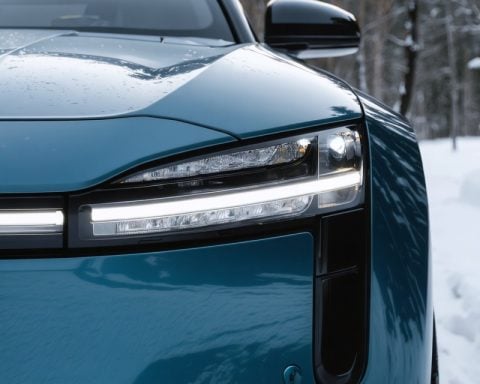The Future of Electric Vehicle Charging in Colorado
Electric vehicle enthusiasts in Colorado have a significant milestone to celebrate! On January 16, Governor Jared Polis, along with the Colorado Energy Office and the Department of Transportation, unveiled the state’s very first National Electric Vehicle Infrastructure (NEVI) fast-charging station. This groundbreaking facility is located at the AC Hotel in Frisco, set to serve as a vital hub for EV travelers.
Approximately 70 miles west of Denver, this site is strategically placed along the popular I-70 mountain corridor, catering to those heading to Colorado’s famed outdoor activities. The location not only serves electric vehicles but is also surrounded by essential amenities, offering convenience for drivers looking to relax and recharge during their travels.
This development is part of a larger initiative fueled by the Infrastructure Investment and Jobs Act, with over $48 million allocated to enhance Colorado’s EV charging landscape. The plan includes establishing at least 60 additional fast-charging locations across the state within the next two years.
The impact of this initiative extends beyond transportation. It fosters a sustainable transportation culture while also promoting environmental awareness and eco-friendly tourism. As charging infrastructures expand, they play a crucial role in supporting the growing electric vehicle market, making this a pivotal moment for Colorado’s green future. With significant advancements underway, the state is leading the charge into a clean transportation era!
Implications of Electric Vehicle Charging Infrastructure in Colorado
The inauguration of Colorado’s first National Electric Vehicle Infrastructure (NEVI) fast-charging station is a milestone that resonates far beyond the state’s borders. With the expansion of charging networks, local economies are expected to flourish, particularly around tourism. As more EV owners seek to explore Colorado’s national parks and ski resorts, the increase in foot traffic could bolster businesses in hospitality, dining, and retail sectors.
Beyond economic benefits, the increased accessibility to electric vehicle charging will significantly contribute to environmental sustainability. Charging stations powered by renewable energy sources—such as solar and wind—can further reduce carbon emissions, promoting a cleaner air initiative. Installing these infrastructures strategically along travel routes encourages not only local residents but also tourists to opt for EVs over traditional gasoline vehicles.
Looking into the future, the development of an extensive charging network could mitigate “range anxiety,” a barrier that has traditionally hindered the widespread adoption of electric vehicles. As more states adopt similar initiatives, this could catalyze a global shift toward sustainable transportation, influencing industries tied to fossil fuels and altering consumer behavior on a larger scale. In the long term, states like Colorado are setting a precedent that could lead to significant legislative changes and increased consumer demand for clean technologies, charting a new course for both the economy and the environment.
Revolutionizing Travel: Colorado’s Electric Vehicle Charging Future Unveiled!
The Future of Electric Vehicle Charging in Colorado
Colorado is on the brink of a transportation revolution, thanks to the recent establishment of its first National Electric Vehicle Infrastructure (NEVI) fast-charging station. Located strategically approx 70 miles west of Denver in Frisco, this facility marks a significant milestone in enhancing the state’s EV infrastructure and promoting sustainable travel across Colorado’s picturesque landscapes.
Fast-Charging Stations: Features and Innovations
The NEVI fast-charging station at the AC Hotel in Frisco not only provides essential charging capabilities for electric vehicles but is designed with user experience in mind. Here are some key features:
– High-speed Charging: The facility enables rapid charging, allowing EV owners to recharge their vehicles in a shorter time frame, which is crucial for long-distance travel on routes like I-70.
– Amenities: Surrounding services such as food, restrooms, and lodging cater to drivers’ needs, making it convenient to take breaks during long journeys.
– Accessibility: Chargers are designed to be easily accessible, accommodating a wide range of electric vehicles on the market.
Pros and Cons of the New Charging Infrastructure
Pros:
– Increased Accessibility for EV Owners: The expansion of fast-charging stations alleviates range anxiety for electric vehicle owners traveling in remote areas.
– Promotion of Sustainable Tourism: By facilitating electric vehicle use, Colorado promotes eco-friendly travel options for tourists visiting its natural attractions.
– Job Creation: The installation and maintenance of charging stations create job opportunities in the green energy sector.
Cons:
– Initial Costs: Developing extensive charging stations requires significant upfront investment, which may lead to increased costs for taxpayers initially.
– Dependence on Technology: As the number of electric vehicles rises, the demand for charging stations must keep pace, necessitating ongoing technological advancements.
Market Analysis and Trends
The push for electric vehicle infrastructure in Colorado aligns with national trends toward decarbonization and renewable energy adoption. The infrastructure initiative, backed by over $48 million from the Infrastructure Investment and Jobs Act, is indicative of growing governmental support for green technologies.
As more states follow similar paths, we are likely to see a unified effort to introduce robust EV networks nationwide, which could result in:
– Increased EV Adoption: Enhanced charging infrastructure may encourage more consumers to consider electric vehicles as a feasible option.
– Climate Change Mitigation: Better access to EV chargers supports efforts to reduce greenhouse gas emissions from conventional gasoline vehicles.
Future Predictions and Sustainability Insights
Experts predict that by 2030, Colorado could see a significant increase in electric vehicle usage, aiming for 940,000 EVs on the road. This shift not only has economic implications but also affects sustainability efforts and state policies.
Continued investment in EV infrastructure is essential, not just in urban areas but also in rural and mountainous regions, to ensure that all Coloradans can participate in the green energy movement.
Conclusion
The unveiling of the NEVI fast-charging station represents a transformative step toward a sustainable transportation future in Colorado. With the commitment to adding at least 60 more charging locations in the coming years, this initiative positions Colorado as a leader in the electric vehicle movement, appealing to eco-conscious travelers and fostering a culture of sustainability.
For more information about Colorado’s green initiatives, visit the Colorado state website.


















